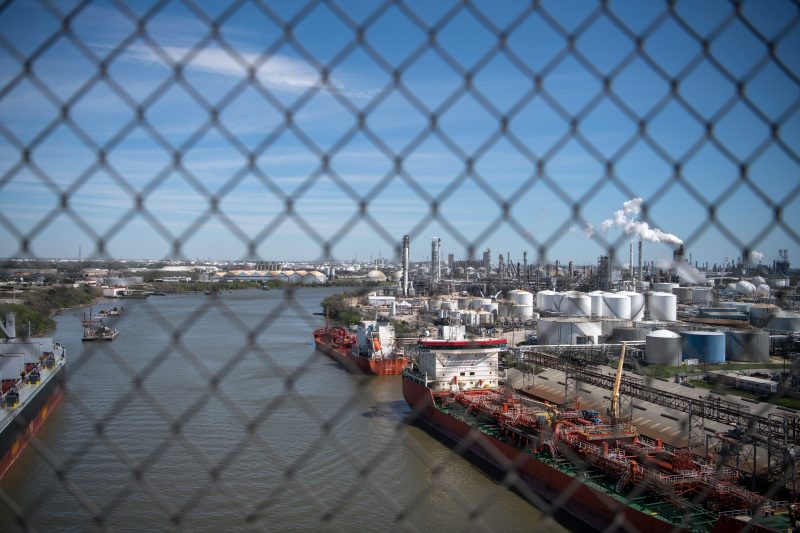In Houston, tech and health are cures for the oil ‘curse’
Oil infrastructure in the Port of Houston serves as a reminder of the industry’s importance to the local economy (Loren ELLIOTT)
Houston (AFP) – In the heart of Texas oil country, the city of Houston rode high on the oil boom, but then fell hard when the bottom dropped out of crude prices.
But bit by bit America’s fourth-largest city is weaning itself off its dependence on oil, betting instead on industries like healthcare and tech, even though black gold is never far from view in the birthplace of the American petroleum industry.
In the southern part of town, the Texas Medical Center covers two square miles (more than five square kilometers), with glass towers stacked between multiple medical schools, a children’s hospital and a trauma center.
About 10 million patients a year seek specialist treatment at the center, where 110,000 people work, making it Houston’s biggest employer.
And TMC’s rapid expansion has helped to make the health sector the biggest job creator in the state as well, employing more than 11 percent of workers in Texas, compared to only 8.6 percent in energy.
Patrick Jankowski, vice president of the Greater Houston Partnership, told AFP the city had “no choice” but to bank on other industries.
“To provide jobs for people here, we had to grow healthcare, life sciences, tech,” he said, noting that just 30 years ago, eight in 10 jobs in the city depended on the hydrocarbon industry.
– Blessing or curse –
The state has always had an embarrassment of oil riches. With 30 million Texans, the state is the second most populous after California and home to the largest oil reserves of the world’s biggest petroleum producer.
But this underground blessing has at times been a “curse.” As many developing countries have experienced, the abundance of one commodity often discourages investment in other industries and linking their fate to a single industry.
The last oil slump was in 2014, when prices for benchmark crude sunk from $107 to $44 in just six months, causing painful layoffs.
The damage was widespread.
“We had to shift. It was not lucrative to work in an industry where there were too many people looking for work,” said AJ Mahmoud of the recruiting firm Michael Page.
Just a few years ago, the energy sector accounted for 95 percent of the positions the company filled in Texas, compared to just five percent globally.
The company now focuses on construction and real estate.
At the same time, energy accounts for a shrinking share of the state economy, slipping to just 8.5 percent in the final quarter of last year from 13.4 percent in the second quarter of 2014.
And while Silicon Valley is more than 1,500 miles away, greater Houston and its population of about seven million have made a striking foray into the tech sector.
– Going high tech –
Station Houston, a 25,000-square-foot (2,300-square-meter) startup hub that opened downtown three years ago, has become a symbol of this renewal.
Inside, the leaders of 180 budding enterprises gather and receive advice from mentors or talk to investors. The offices are draped in garish colors, feature open-plan workspaces and sit in the middle of the “innovation district,” a neighborhood embodying local authorities’ hopes for the new economy.
“Our mission is to transform Houston into a world-leading technology and innovation capital,” said Payal Patel, head of business development at Station Houston.
This is far from a done deal, however. Houston, and the other two big cities in Texas — Austin and Dallas — are far behind major US metropolitan areas, such as San Francisco and New York, in attracting startup capital.
And despite its shiny new electronics and modern image, Station Houston is still tied to the old ways: 40 percent of its startups linked to the energy business and oil titan Exxon Mobil supported the creation of the center.
Nevertheless, “Houston has moved away from the oil curse,” said Andy Lipow of Lipow Oil Associates.
“We have diversified so much over the years. If oil hits $30 again, the Houston economy will be impacted but not as it could have been in the ’80s and ’90s.”
Disclaimer: Validity of the above story is for 7 Days from original date of publishing. Source: AFP.


